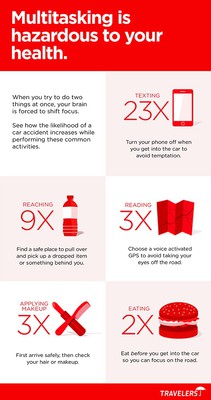Safety professional Chris Hayes helps make sense of the science behind distracted driving. You may be surprised to learn that cell phones are just a small part of the problem.
The fact is, everything that occupies your mind or your vision can contribute to distraction behind the wheel.
Cognitive distraction
Your brain is only capable of processing a certain amount of information at any given time.
When we attempt to perform multiple tasks at the same time, like driving while talking on the phone or eating, we can encounter performance problems. Multiple tasks compete for our brain's attention. Some studies have shown that drivers using cell phones look at, but fail to see, up to 50 percent of the information in their driving environment.¹
Visual distraction
You have to look where you are going.
Sounds simple, right? Yet, we see people driving without looking where they are going every day. Driving while visually distracted can be like driving with your eyes closed. You would not make a turn or change lanes with your eyes closed. Yet, distracted drivers are, in effect, doing just that.
Imagine driving the length of a football field with your eyes closed. That is the equivalent of texting while driving at 55 mph. Because texting takes our attention away for an average of 4.6 seconds², we are 23 times more likely to be involved in a crash.
Other common distractions include eating, adjusting music or GPS devices, applying makeup, reading, and reaching for moving objects. Each of these tasks dramatically increases your odds of getting into an accident.

Distracted drivers are:
- 9 times more likely to have an accident if reaching for a dropped water bottle or other moving item.3
- 3 times more likely to have an accident if reading.3
- 3 times more likely to have an accident if performing personal grooming, such as applying makeup or lipstick.3
- Almost 2 times more likely to have an accident if eating while driving.4
Cognitive, visual or both?
The science is clear. Distraction can keep you from driving safely in multiple ways. Any distraction, regardless of how quick or harmless it may seem, should be avoided when you are behind the wheel. Remember to keep your eyes and brain focused on the road at all times.
Find more information about distracted driving at distraction.gov.
At Prime Insurance Agency, we can work with you to make sure you've got the coverage you need, while at the same time using all possible credits and discounts to make that coverage affordable.
Call us at 732-886-5751 or send us a note at PRIME [at] primeins [dot] com. We want to help you meet your goals, and make sure what's important to you is protected
Editor's note: This article first appeared on travelers.com and is reprinted here with their permission. Click here for the original post.


Discussion
There are no comments yet.